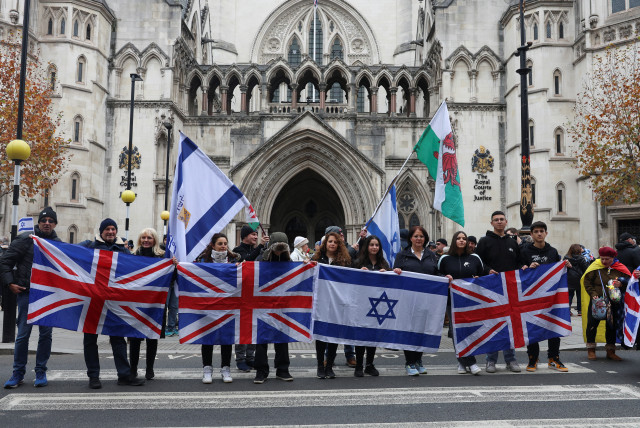Over 40% of UK Jews feel threatened by antisemitic conspiracy beliefs

Over 40% of Jews living in the UK reported feeling threatened by the widespread belief in conspiracies aimed at them.
Researchers in the United Kingdom found that more than 40% of UK Jews feel significantly threatened by the perceived popularity of Jewish-targeted conspiracy theories.
A recent study published in the British Journal of Psychology by Daniel Jolley, Jenny L. Paterson, and Andrew McNeill has brought to light the profound impact of conspiracy theories on their targeted groups.
The study, focusing on the Jewish community, revealed a startling statistic: over 40% of Jewish participants reported feeling threatened by the widespread belief in conspiracies aimed at them.
The research, titled "The impact of conspiracy beliefs on a targeted group: Perceived popularity of Jewish-targeted conspiracy beliefs elicits outgroup avoidant behaviors," offers a unique perspective on the psychological consequences of being the focus of conspiracy theories. It shows that the perceived popularity of such beliefs can trigger significant emotional and behavioral responses among those targeted.
In the first of three studies, involving 250 Jewish participants, the researchers found a positive correlation between the perceived prevalence of Jewish conspiracy theories and feelings of intergroup threat, alongside a negative correlation with closeness to non-Jewish people.
Psychological impact of antisemitic beliefs
As Daniel Jolley, the lead researcher, explained, "Perceiving ingroup-related conspiracy beliefs as popular is associated with negative intergroup outcomes, including feeling threatened and being more likely to want to avoid intergroup contact."
The second study, with 194 participants, employed an experimental design to manipulate the perception of conspiracy theory popularity. This approach demonstrated that exposure to the belief that many non-Jews endorse Jewish conspiracy theories led to increased intergroup threat and emotional reactions, including anxiety and anger. These emotional states were then linked to avoidance behaviors.
The final study, involving 201 participants, reinforced these findings. It used a similar experimental setup and discovered that conspiracy theory popularity could even influence participants' willingness to interact with non-Jewish individuals in a behavioral task.
"Our work provides evidence that conspiracy beliefs, especially when perceived to be widely held, are likely to significantly impact targeted ingroup members," stated Jenny L. Paterson, a co-author of the study.
This research series provides crucial insights into the often-overlooked consequences of conspiracy theories on the groups they target. By highlighting the psychological impact on Jewish individuals, the study calls for greater attention to be paid to the experiences of those victimized by such beliefs.
It underscores the need for not just challenging conspiracy theories but also supporting the targeted groups in coping with their effects.
"The impact of conspiracy beliefs on a targeted group: Perceived popularity of Jewish-targeted conspiracy beliefs elicits outgroup avoidant behaviors," was first published on December 3rd in the British Journal of Psychology. The study can be accessed online.
Jerusalem Post Store
`; document.getElementById("linkPremium").innerHTML = cont; var divWithLink = document.getElementById("premium-link"); if (divWithLink !== null && divWithLink !== 'undefined') { divWithLink.style.border = "solid 1px #cb0f3e"; divWithLink.style.textAlign = "center"; divWithLink.style.marginBottom = "15px"; divWithLink.style.marginTop = "15px"; divWithLink.style.width = "100%"; divWithLink.style.backgroundColor = "#122952"; divWithLink.style.color = "#ffffff"; divWithLink.style.lineHeight = "1.5"; } } (function (v, i) { });

